Several people who were detained for participating in mass protests in Belarus this week allege that the country’s security forces beat, tortured and humiliated them while in government custody.
The protesters are among the thousands of people who were arrested in the sometimes violent unrest that has rocked the former Soviet republic since its presidential election on Sunday, which many believe was rigged.
The Belarusian Central Elections Committee (CEC) on Friday announced its final results, giving embattled President Alexander Lukashenko 80.1% of the vote and opposition candidate Svetlana Tikhanovskaya 10.1%.
Opposition groups claim the election was marred by fraud to keep Lukashenko in power, and protests began after exit polls showed Lukashenko, who has ruled Belarus for 26 years, had won by a landslide.
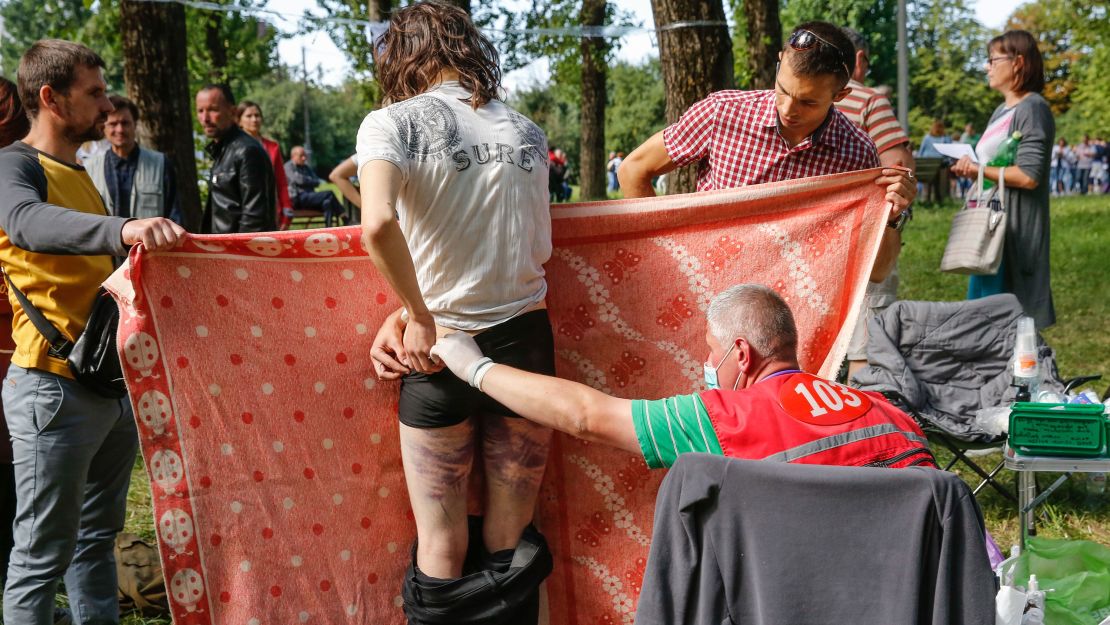
Tikhanovskaya on Friday called for city mayors to organize peaceful protests this weekend, and asked her supporters to sign an online petition demanding a vote recount, with the presence of independent observers.
Lukashenko’s government had already been accused of responding to the protests with disproportionate force and violence, but the accusations of mistreating people behind bars has prompted renewed public outrage toward the government.
A woman named Olesya told CNN that she was arrested Sunday while walking down the street alongside her boyfriend in the capital, Minsk.
She said she was forced to strip naked alongside other women before being searched at a detention center. Olesya, who declined to give her last name for safety reasons, said she was then put in a small cell with 17 other women. All of them were given one water bottle and no food and forced to sleep on the floor or a small table.
The guards periodically cut off their access to water to silence them. They also denied medical assistance to one of the women, who had been injured by a rubber bullet.
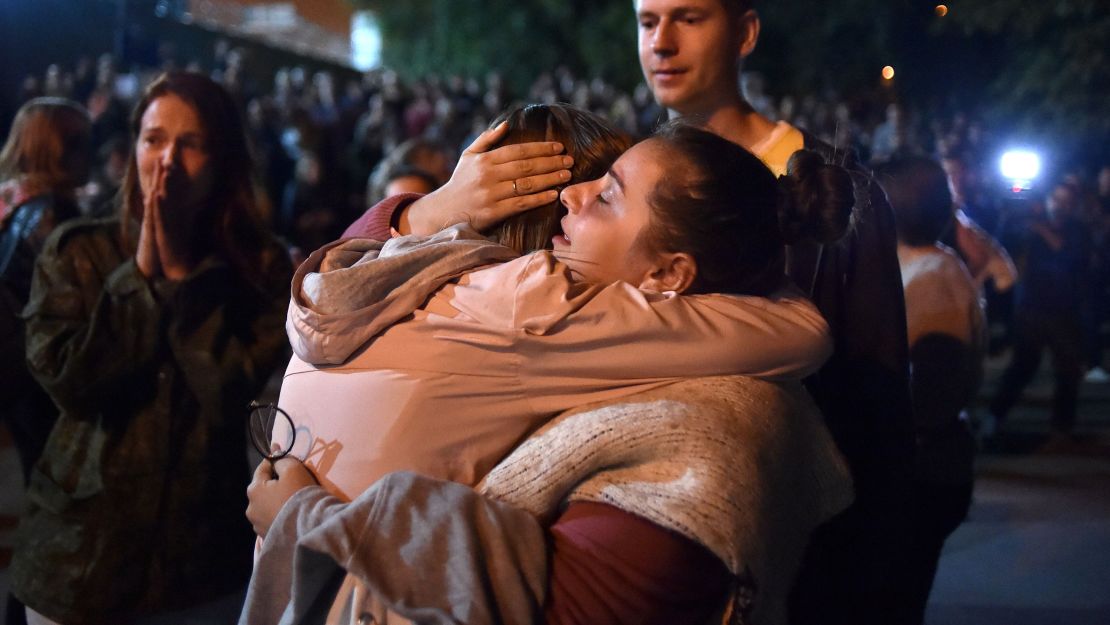
Olesya said she spent around 14 hours inside the facility and was released after being forced to sign a paper with what she says were false charges against her. However, her boyfriend is still missing. She is very worried because men appear to be treated much worse than women, according to witness accounts.
“They would put four men in a 1.5 meter (5 foot) wide cell, three were standing but they made the fourth one crawl inside like a dog and stand on his knees,” said Olesya.
Olesya said she keeps coming back to the detention center both to get information about her partner and help others.
“It was very scary to wait outside, we could hear how they were beaten, they wailed, they screamed,” she said. “They stormed out of there with crazy eyes and half-conscious … they just ran in whatever direction the guards told them to and also told them not to approach us, who could help them get home, threatening they would put them back into prison.”
Authorities release 2,000 people
Belarus authorities have now released more than 2,000 people detained amid the ongoing protests, according to a Friday statement from its interior ministry.
The authorities were “concerned about the problem of overcrowding in places of detention,” the statement said. It suggested more people would be released. “We understand that it is not as fast as we would like. We are doing everything we can to resolve this situation,” the statement said.
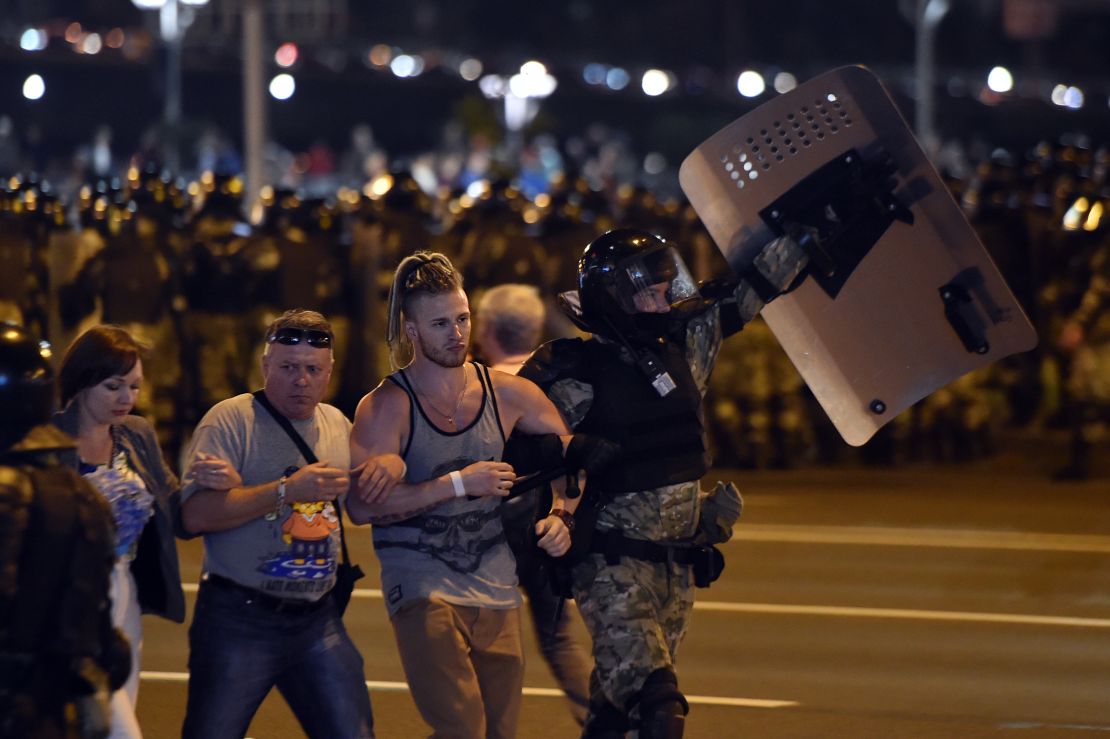
Officials in Belarus say 6,700 people have been arrested and at least one person has been killed in the violent aftermath of Sunday’s presidential election which independent observers have criticized as neither free nor fair.
The interior ministry statement said Thursday was the “calmest day” this week with mostly peaceful protests.
At the Okrestina detention center in Minsk, hundreds have been gathering the past two days trying to locate their relatives and friends who were detained during the protests. Some were missing for days, according to people interviewed by CNN, as the authorities often do not disclose the location of detainees and forbid passing food, water or medication.
Ivan, who also did not wish to disclose his last name, told CNN that while he was searching for a friend at the detention center early Thursday, he witnessed a young man with broken arm and leg leave the building.
“People are being beaten up, tortured from the moment when they are detained in the streets,” Ivan said. “Then they are taken to local police station, beaten there and then they bring them here after a day or two, and the beatings and torture continue.”
Several other people have shared similar accounts of mistreatment while in government custody. Reports and pictures showing injuries sustained by the detainees have also appeared on social media. The Belarusian Association of Journalists said in a statement it recorded dozens of cases of violence against journalists, while several remain in detention.
The Russian independent news outlet Znak.com published an account by one of its journalists, Nikita Telizhenko, who reported in Minsk and said he had spent 16 hours detained with multiple protesters grabbed from the streets who were forced to lie face down in pools of blood, with some men stacked on top of another.
“The most brutal beatings were happening all around: hits, screams, cries and shrieks coming from everywhere,” Telizhenko said. “I felt that some of the detained had broken bones – hands, legs, spines – because with the tiniest bit of movement they wailed in pain.”
Telizhenko says he was eventually released after an intervention from the Russian Embassy, which helped release and repatriate several journalists back to Russia.
Opposition leader calls for peaceful protests
“The results of the elections were approved by the decision of the commission,” said a statement on the official CEC website on Friday. “Alexander Grigorievich Lukashenko was elected President of the Republic of Belarus.”
Tikhanovskaya, who fled Belarus to Lithuania this week under what her associates said was pressure from Belarusian authorities, rejected the results and demanded a recount.
In a video statement posted Friday, Tikhanovskaya said: “We the supporters of change are the majority. There is documentary evidence of this … Where the commissions counted the votes honestly, my support ranged from 60 to 70%, and in Novaya Borovaya [neighborhood] 90%.”
“I ask all the mayors of the cities on August 15 and 16 to act as organizers of peaceful mass meetings in each city. New forms of peaceful protests appear on the streets of our cities, the chains of solidarity of women with flowers are absolutely not belligerent, they show the whole world that we, Belarusians, are open, honest people and we are against violence,” she added.
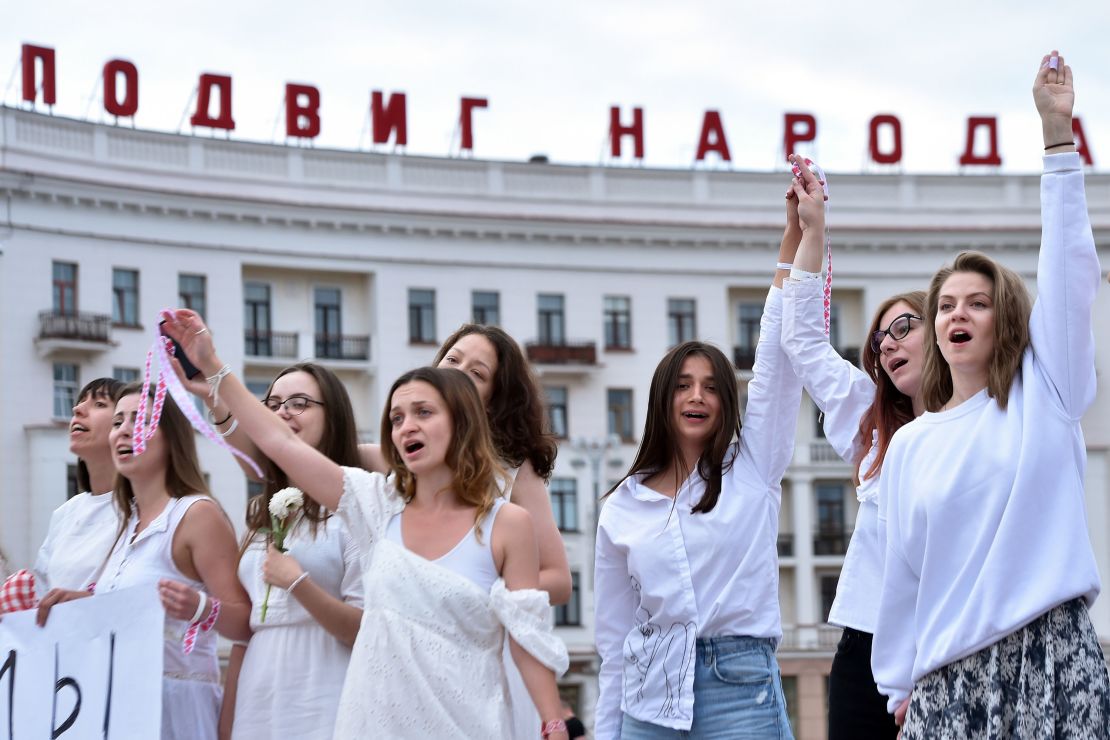
Tikhanovskaya announced she will create a coordination council with the hope of transferring power in Belarus, according to a statement on her party’s official Telegram channel.
The candidate is “ready for dialogue with the authorities,” the statement said, and has instructed her associates to accept applications for the nomination of Council members from organizations and associations of citizens.
“I ask you to join the coordination council. We really need your help and experience. We need your connections, contacts, expert advice and support. This coordinating council should include everyone who is interested in dialogue and the peaceful transfer of power – labor collectives, parties, trade unions and other civil society organizations,” Tikhanovskaya said in the statement
The opposition politician also appealed to the international community to and European countries to help organize a dialogue with the Belarus authorities.
In a statement on Twitter on Friday, Ursula Von der Leyen, President of the European Commission, said: “We need additional sanctions against those who violated democratic values or abused human rights in Belarus.”
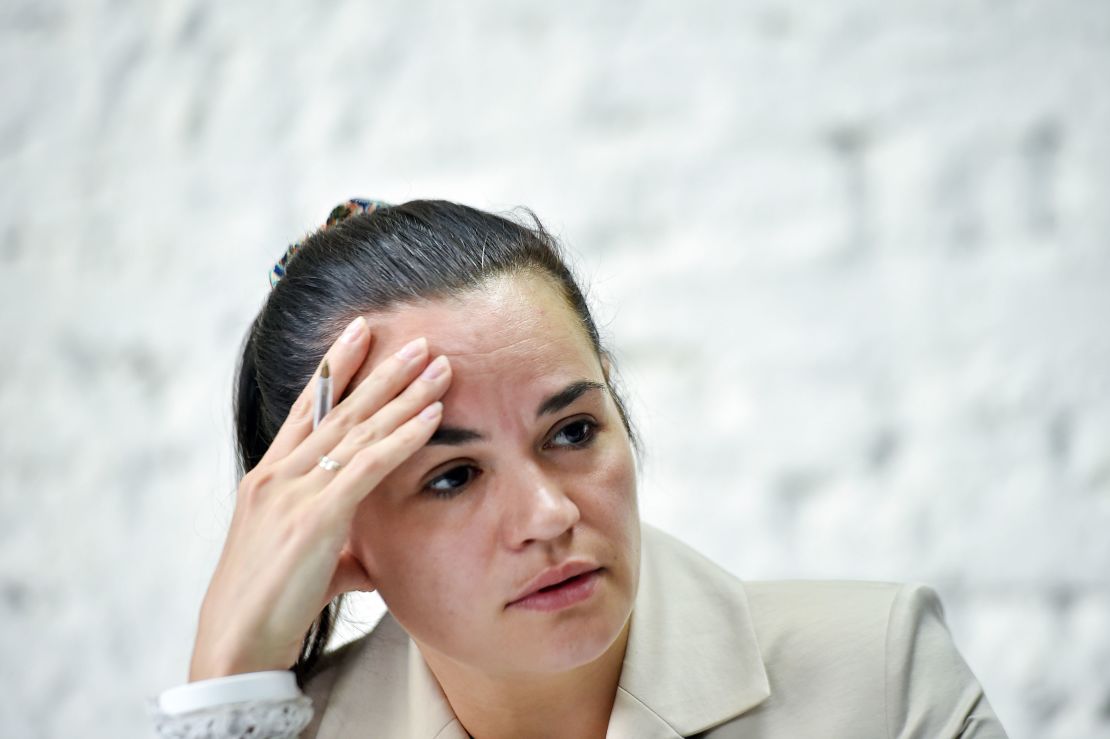
She added, “I am confident today’s EU Foreign Ministers’ discussion will demonstrate our strong support for the rights of the people in Belarus to fundamental freedoms & democracy.”
The country’s Foreign Minister Vladimir Makei said in a Friday statement that Belarus was ready for a “constructive and objective dialogue” with foreign partners regarding the disputed election result, after a call with his Swiss counterpart Ignazio Cassis.
“The Belarusian side noted its readiness for a constructive and objective dialogue with foreign partners on all issues related to the development of events in Belarus during the election campaign and after its completion,” the foreign ministry statement said.
The call was made “at the initiative of the Swiss side,” the statement adds.
Makei also expressed “gratitude” to the Swiss Foreign Minister, “for ensuring security and order during voting at the polling station at the Belarusian Embassy in Switzerland.”
Change of tactics
Despite the brutal crackdowns, the opposition has shown no sign of backing down. But it has changed strategy and tactics.
Thousands of mainly female peaceful demonstrators clutching white flowers and balloons lined the streets of Minsk Thursday as part of a more decentralized protest. Across the country, women are forming so-called “solidarity chains” to demand an end to the violence and that those detained be released. White ribbons, bracelets and shirts have become symbols of the movement, a color that initially representing the peacefulness of protesters and later morphed to reflect the old Belarusian flag – white with a red stripe – which can be seen hanging from many windows in the city.
One chain of protesters in Minsk was almost two miles (3.2 kilometers) long. Cars passing by often honked to show their support.
During an interview with CNN on Wednesday, Maria Kolesnikova – the last of the three women who became the faces of the country’s opposition still in the country – wore a white suit as she said she believed that the clashes over the disputed elections results signal the decline of Lukashenko’s presidency.
The trio – Kolesnikova, Tikhanovskaya and Veronika Tsepkalo – joined forces to take on Lukashenko in the election after several opposition candidates were either barred from running or jailed. Lukashenko dismissed the trio as “poor girls” in his annual state of the union address last week, and said he would not “give the country away.”
But the women appeared to enjoy significant support. Tikhanovskaya’s campaign rallies saw significant turnouts even in small Belarusian towns not known for their protest activity. About 63,000 people attended the largest event in Minsk in July – making it the biggest demonstration in the past decade.
The independent monitoring group “Honest People” said that according to its data, Tikhanovskaya – who was standing in for her jailed husband – had won in at least 80 polling stations across Belarus in Sunday’s vote, prompting many to demand a recount.
Tikhanovskaya and Tsepkalo say they were forced out of Belarus after the election because of threats from the government. Tikhanovskaya’s campaign told CNN on Sunday that nine people associated with the campaign had been arrested, and her decision to leave was made in part to free her peers.
‘I’m not a bloodthirsty person’
Lukashenko claimed earlier this week the protests were initiated by “foreign puppeteers” adding that the law enforcement will not back down and maintained he still enjoys widespread support.
However, the allegations of torture appear to have fueled public anger toward the government.
On Thursday, thousands gathered in Zhodzina, a town around 50 kilometers (31 miles) outside of Minsk, where one of the main detentions is located. Videos from the event showed people chant “Release!” and “Leave!” – a chant evidently directed at Lukashenko.
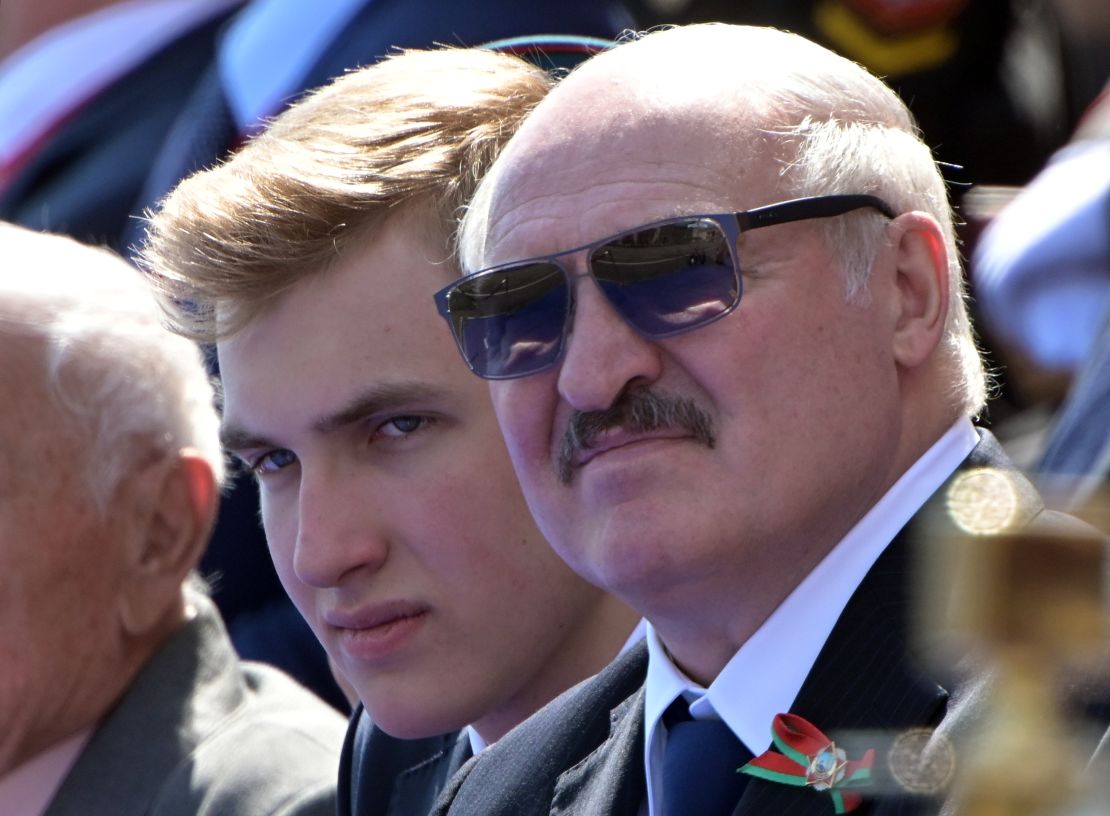
Some of the country’s military and police officers also appear to be turning against Lukashenko and showing support for the opposition. A video posted on Instagram by a man named Evgeny Novitski shows his brother – a former special forces officer – throwing his uniform into a trash can, saying he is not proud of his job anymore.
“Hi all! I gave an oath to my people, and looking at what’s happening in Minsk right now, I can’t be proud of where I’ve been serving, and so, I can no longer keep this uniform at home,” the former officer says.
Another video posted by Belarusian TV station Nexta, shows a police officer named Ivan Kolos saying he refuses to follow “criminal orders.” He urged his colleagues to not point guns at peaceful people and be with them instead. He said he would take orders from Tikhanovskaya, not from Lukashenko.
The growing outcry prompted some Belarusian authorities to apologize late Thursday, a reversal from their previous rhetoric promising a severe response to protesters.
“I want to take full responsibility and apologize in a humane way to these people … I’m not a bloodthirsty person and I don’t want any violence,” Belarusian Interior Minister Yuri Karaev said in an interview with a state TV channel ONT.
Karaev also addressed the use of force against journalists by saying he is “against any violence against journalists, but this does not mean that you need to climb between the two sides, do not go into the thick of it!”
Lukashenko’s longtime ally and speaker of the Belarus senate Natalya Kochanova also came out with a televised statement on the President’s behalf urging Belarusians to “stop” and “cease self-destruction.”
“Less than a week ago, presidential elections were held in the Republic of Belarus. The people made their choice. But everything that happened next is an unprecedented attempt to destroy what we have always been proud of – our peaceful life,” Kochanova said.
“We all don’t need a fight, we don’t need a war. Minsk has always been quiet and calm,” Kochanova said. “The President heard the opinion of labor collectives and instructed to investigate all the facts of detentions that have occurred in recent days. Intensive work in underway today already more than a thousand people have been released under the obligation not to participate in unauthorized events.”
CNN’s Joshua Berlinger, Emma Reynolds and Isabel Tejera contributed to this report.






